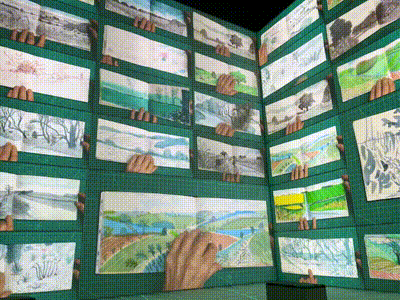#15 :: 500 words per day
Or, how to navigate briefs lacking boundaries, structure, timelines
It’s a right palaver, writing a doctorate.
It forces the flexing of all creative muscles known to mankind.
Gaily start with an inkling of an idea. Then, somewhere around 208 weeks later (if you’re both organised and lucky), stand on a stage and defend your 300 page masterpiece to experts at the pinnacle of your domain.
Hockney Yorkshire iPad drawings, 2011It all begins as a project without boundaries. No structure. No fixed timeline. That’s petrifying in all regards. On day one, you realise that the initial task is reading and understanding everything that's ever been written on your subject. Plus all the surrounding theories. Subsume it all, and identify a gap in the knowledge, ripe for your original contribution. Depending on your subject, the effort consumes the entire first year.
Then the actual work starts.
In that first year there’s little in the way of direction. It’s an uncertain and ambiguous time, awaiting - hoping - the pieces fall into place.
Yet the pursuit tells a lot about the creative process. And quite a lot about creative endurance.
So what can we learn?
My own PhD experience is revealing.
I wrote it in Ireland. End of the Celtic Tiger period. My supervising professor was a classic Irish gentleman and academic. The creator and editor-in-chief of a distinguished journal, he extolled long walks when pondering the absurdities of life.
Though I didn't know it at the time, this gent offered some of the best creative advice that has served long after my own eventual triumph.
The secret is really rather simple.
Amidst the abstract theory, complex paradigms, meandering sentences, the secret is really rather simple.
"Write 500 words per day".
“Write about what you read, what you think about it, what it means. That’s one page of typed A4. Just write”.
Just write.
I adopted the method. It offered a scintilla of control in creating something marvellous. Some days were brutal, but the practice gave discipline, structure, routine. Space to develop a voice. Clarity in organising my thoughts. And later, when it came to actually writing and editing, it offered choice - flexibility, freedom and inspiration.
It was the way to begin.
The creative process is like that. It’s a blank canvas. An empty white room. Yet to create something to be proud of - to achieve greatness - means starting.
At first, the fruits are sub-optimal. Not quite what you had envisaged. My first months of writing have never seen the light of day. None of my early A4 pages made it into the thesis. But they did provide a platform for reworking, developing thoughts and ideas as my understanding grew.
“The moment you put two or three marks on a piece of paper, you get relationships.”
— David Hockney
We’re all learners, at first.
We’re all learners, when we start to do something new. We don’t yet know what is possible, or our destination.
I’m always fascinated by artists’ preparatory sketches - experimentations and trials that help creative decisions.
Here are David Hockney’s Normandy notebooks, at the Bigger & Closer (Not smaller and further away) exhibition. Artworks, in the process to becoming other works of art.
David Hockney says: “The moment you put two or three marks on a piece of paper, you get relationships. They’ll start to look like something. If you draw two little lines they might start to look like two figures or two trees”.
And from those marks, the initial thoughts, meaning begins to form. The fogginess begins to clear. A destination comes into focus.
That’s it: Construct a first sentence. Then another. Connect them together. And follow with some more.
What’s your secret for starting off?



